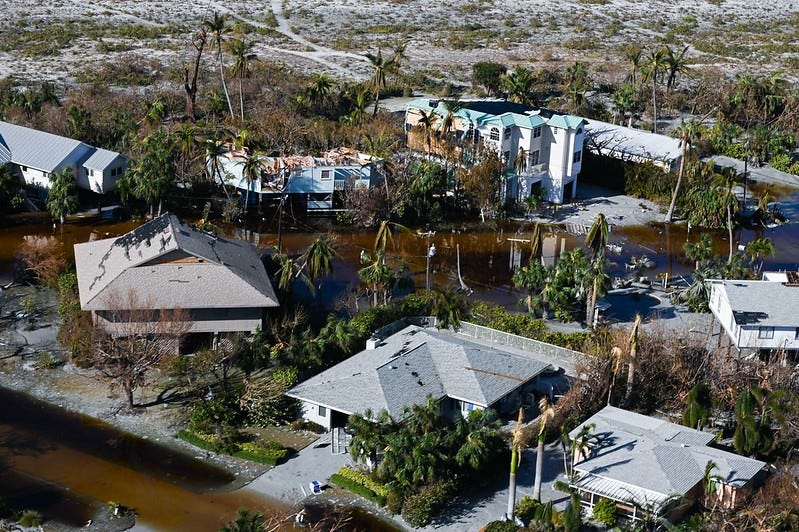There's only one problem with this week's Big Oil politics - price
Welcome to Callaway Climate Insights -- the daily global newsletter for ESG investors. Please enjoy, and share.
Today’s edition is free. To read our insights and support our great climate finance journalism four days a week, subscribe now for full access.
This image, taken in Velebit, Croatia, is one of the 80 candidates for the World Meteorological Organization’s 2023 calendar, which shows the beauty and power of our weather, the need to protect and preserve our water resources, and the impacts of climate and environmental change. You can vote here. Photo: Aleksandar Gospić.
Time was that production cuts by OPEC would shake world markets. I remember my journalist colleagues at Bloomberg in Europe chasing OPEC members around Vienna twice a year during meetings in the ‘90s, looking for any sort of utterance that would indicate a cut was coming, because of how much the news meant to clients.
No more. This week’s 2-million-barrel cut, or about 2% of global supply, while generating ferocious political headlines about OPEC and Russia teaming up against President Joe Biden, barely moved the needle in oil markets. West Texas Crude remains below $90 a barrel — far below its peak above $120 earlier this year.
Part of it is that Europe has worked hard to lessen its dependence on Russian oil. The European Commission announced Thursday that because of increases in imports of liquid natural gas and oil and gas from other pipelines, it has reduced its supplies from Russia to 7.5% from 41% this past spring when Russia invaded Ukraine.
Part of it stems from people driving less, or even switching to electric vehicles, to move away from oil as the economy weakens and recession looms. And part comes from the fact that renewable energy continues to surge. Growth in solar, battery and wind power has more than tripled in the past decade, according to a new report today by the Environment America Research & Policy Center and Frontier Group, with battery and solar leading the way.
The outlook for oil, despite continued politics and international intrigue, is not good. All of which makes it even more frustrating to be a state pension employee in Louisiana this week, after its state treasurer pulled $794 million out of BlackRock BLK 0.00%↑, saying the world’s largest asset manager is “anti-fossil fuel.”
Doubling down on a losing bet is no way to run a retirement fund.
More insights below . . . .
Don’t forget to contact me directly if you have suggestions or ideas at dcallaway@callawayclimateinsights.com.
Zeus: Corporate ESG momentum threatened by first recession of the climate era

. . . . Faced with the first recession since the rise of ESG, many CEOs are putting environmental, social and governance initiatives on the back burner as they face cost cuts and budget reductions, according to a new KPMG study. David Callaway argues that the removal of ESG from corporate priorities is a direct result of the lack of regulation and reporting around climate risk, the types of which authorities in Europe and the U.S. have so far been unsuccessful in accomplishing. Climate change, meanwhile, chugs along. . . .
A selection of this week’s subscriber-only insights
. . . . Cervest, the London-based climate intelligence firm run by Iggy Bassi, launched a ratings system this week to promote its climate risk software, which can rank as many as 500 million global assets — from individual buildings to roads, bridges and cities — by their vulnerability to climate events such as drought, floods or fires. The new product is a natural evolution for Cervest as it evolves its technology into tools financial professionals can easily use to measure the climate risk of their portfolios. . . .
. . . . Could this inspire a trend? A 100% solar-powered community near the area hardest-hit by Hurricane Ian came through the devastating storm in good shape, with the power still on. An advantage: Little to none of the electricity-transmission infrastructure that gets wrecked by fierce weather events. Read more. . . .
. . . . The headline reads positive — “Most electric car buyers don’t switch back to gas” — but the numbers, though improving, do not seem particularly great. After all, if EV ownership is that great, why are the figures not at about 90%? We look into the reasons. Read more here. . . .
. . . . Despite market turmoil, the clean energy deals just keep on coming. The latest is a potential purchase by Blackstone BX 0.00%↑ of Emerson Electric’s EMR 0.00%↑ commercial and residential solutions business, which could be worth up to $10 billion, according to Bloomberg, which first reported the talks. The sudden increase in merger and takeover activity comes after the signing of the Inflation Reduction Act last month sparked huge interest in U.S. assets tied to clean energy. . . .
Editor’s picks: Ian’s insurance impact; EV credits
Ian’s double-whammy in Florida: insurance
Even before Hurricane’s Ian estimated $60 billion worth of devastation, the residential insurance market in Florida was struggling under billions in losses, legal costs and fraud, the Associated Press reports. “The difficult environment has put many insurers out of business and caused others to raise their prices or tighten their restrictions, making it harder for Floridians to obtain insurance.” The report cites the Insurance Information Institute as saying about 12% of Florida homeowners don’t have property insurance — or more than double the U.S. average of 5%. The report also notes that Florida’s insurance industry has had two consecutive years of net underwriting losses exceeding $1 billion each year. A string of property insurers have become insolvent, while others are leaving the state.
Renewable fuel credits could boost EVs
EVs could become eligible for renewable fuel credits, if the EPA is successful in proposing the benefit, as indicated in several published reports. The plan, first reported by Reuters, would be for the agency to add the credits element to an upcoming proposal on biofuel blending mandates. According to the report, which cited sources familiar with the matter, the EPA is expected to send the proposal, which will address mandates for after 2022, to the White House for approval by the end of next week. U.S. News and World Report said the EPA did not confirm details, but quoted EPA spokesperson Tim Carroll as saying the agency intends to meet the deadlines to implement the RFS program. Sources told U.S. News and World Report that electric vehicles would likely qualify for credits under the program’s “D3” mandate pool.
Latest findings: New research, studies and projects

Stress-testing economies for climate shocks
In an effort to stress-test the global economy to extreme climate change-related shocks on large and interconnected economies, this IMF working paper identifies large and interconnected economies vulnerable to climate change-related shocks, estimates these economies’ external financing needs-at-risk due to these shocks, and quantifies the spillovers to the global economy using a global network model. The authors of Stress Testing the Global Economy to Climate Change-Related Shocks in Large and Interconnected Economies write in the abstract, “We show that large and interconnected economies vulnerable to climate change could trigger a drain of $1.8 trillion in international reserves (2% of 2019’s global GDP). Domestic and multilateral macroeconomic policies can help reduce these global losses to about $0.8 trillion. The scenario highlights the importance of considering global spillovers when assessing the impact of climate change-related shocks.” Authors: Yeu Jin Jung, Independent; Camilo E. Tovar, International Monetary Fund; Yiqun Wu, IMF; Tianxiao Zheng, IMF.
More of the latest research:
Words to live by . . . .
“Over-dependence on finite resources, like oil, ignores the ability of our great minds to develop alternative energy for the masses, and in doing so ignores climate change and sets up our students and workforce for failure by not educating them about the needs of our future.” — Deb Haaland, U.S. Secretary of the Interior.






